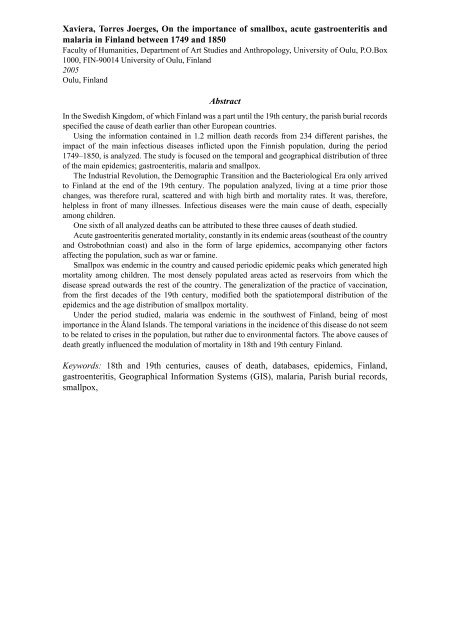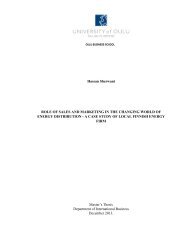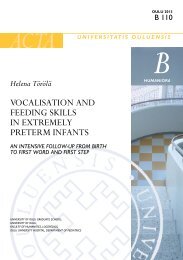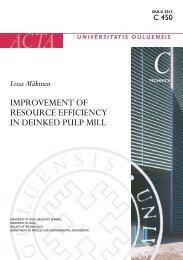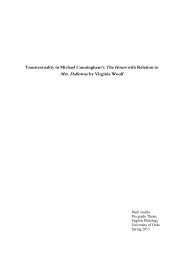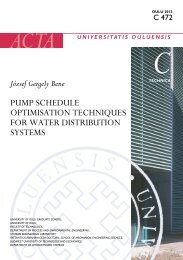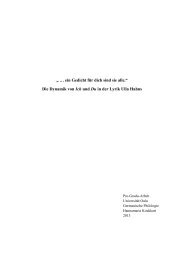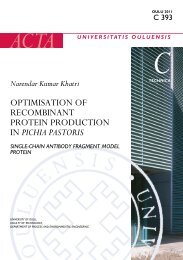- Page 1: IMPORTANCIA DE LA VIRUELA, GASTROEN
- Page 7: Xaviera, Torres Joerges, Importanci
- Page 11: A mis padres y a mi hermano
- Page 14 and 15: mucho, y si no que se lo pregunten
- Page 16 and 17: Tabla 10. Distribución de las muer
- Page 18 and 19: Tabla 46. Causas de muerte consider
- Page 21 and 22: Índice de figuras Figura 1. Altitu
- Page 23 and 24: Figura 24. Distribución de las mue
- Page 25 and 26: Figura 48. Patrón estacional de la
- Page 27 and 28: Figura 72. Porcentaje de muertes de
- Page 29 and 30: Figura 94. Edad media de muerte por
- Page 31 and 32: Figura 120. Distribución mensual d
- Page 33 and 34: Figura 139. Mapa de Finlandia con l
- Page 35: Figura 169. Número mensual de muer
- Page 38 and 39: 3 Material y métodos..............
- Page 40 and 41: 5.3.2 Aproximación temporal ......
- Page 43 and 44: Prefacio Los trabajos que, como és
- Page 45: 43 y desarrollado en sus posteriore
- Page 48 and 49: 46 1.1 Medio físico 1.1.1 Marco ge
- Page 50 and 51: 48 Figura 2. Porcentaje de superfic
- Page 52 and 53: 50 En términos de geografía polí
- Page 54 and 55:
52 este clima la temperatura media
- Page 56 and 57:
54 siendo sustituida, en gran magni
- Page 58 and 59:
56 región sur, aprovechando lo exc
- Page 60 and 61:
58 Figura 9 en la que se representa
- Page 62:
60 1.2.2 Estructura de la població
- Page 65 and 66:
63 densidad de población podía es
- Page 67 and 68:
65 1.3 Marco histórico 1.3.1 Histo
- Page 69 and 70:
67 desconfiaban de la capacidad de
- Page 71 and 72:
69 También en 1812, los territorio
- Page 73 and 74:
71 ya se utilizaban desde el siglo
- Page 75 and 76:
73 En cuanto a la salud pública pu
- Page 77 and 78:
2 Objetivos El principal objetivo d
- Page 79 and 80:
3 Material y métodos 3.1 Material
- Page 81 and 82:
79 Toda esta labor recaía sobre lo
- Page 83 and 84:
81 − No todas las parroquias pert
- Page 85 and 86:
100% 90% 80% 70% 60% 50% 40% 30% 20
- Page 87 and 88:
85 Parroquia Años con datos Años
- Page 89 and 90:
87 Parroquia Años con datos Años
- Page 91 and 92:
89 Parroquia Años con datos Años
- Page 93 and 94:
91 menciona la edad al momento de l
- Page 95 and 96:
93 El número total de registros qu
- Page 97 and 98:
95 fiables (Pitkänen 1977). Alguno
- Page 99 and 100:
97 Tabla 4. Registros de bautismo u
- Page 101 and 102:
99 Para agrupar los datos procedent
- Page 103 and 104:
101 serán, una vez establecidos, u
- Page 105 and 106:
103 El segundo índice pretende med
- Page 107 and 108:
4 Gastroenteritis 4.1 Principales c
- Page 109 and 110:
107 Bacterias del género Shigella.
- Page 111 and 112:
109 La salmonela tífica sobrevive
- Page 113 and 114:
111 Existen otros patógenos bacter
- Page 115 and 116:
113 sin ocasionar daños pero bajo
- Page 117 and 118:
115 4.1.2.2 Vías de transmisión L
- Page 119 and 120:
117 aumento de la incidencia enferm
- Page 121 and 122:
119 1971), lo que coincide con la e
- Page 123 and 124:
121 Tabla 6. Causas de muerte relac
- Page 125 and 126:
123 − El segundo grupo incluye ma
- Page 127 and 128:
125 4.3.1.1 Evolución temporal de
- Page 129 and 130:
35% 30% 25% 20% 15% 10% 5% 0% 1749
- Page 131 and 132:
129 peso sobre todo en la zona sur
- Page 133 and 134:
131 Figura 21. Porcentaje de muerte
- Page 135 and 136:
133 Tabla 9. Numero de muertes por
- Page 137 and 138:
29-364 7-28 0-6 Vacío 135 0% 20% 4
- Page 139 and 140:
35% 30% 25% 20% 15% 10% 5% 0% 137 F
- Page 141 and 142:
139 Se obtienen también 53 años d
- Page 143 and 144:
141 regiones 15 y 16, y el sureste
- Page 145 and 146:
143 Figura 28. Mapa de parte de Fin
- Page 147 and 148:
145 Figura 29. Porcentaje de muerte
- Page 149 and 150:
147 sufrido tanto. Este es el caso
- Page 151 and 152:
149 fueron mejores de lo normal. Po
- Page 153 and 154:
151 Periodo Núm. de muertes Distri
- Page 155 and 156:
153 Periodo Núm. de muertes Distri
- Page 157 and 158:
155 Periodo Núm. de muertes Distri
- Page 159 and 160:
157 Periodo Núm. de muertes Distri
- Page 161 and 162:
159 Tabla 15. Porcentajes de muerte
- Page 163 and 164:
161 La primera zona es claramente O
- Page 165 and 166:
163 más achatada de lo normal, con
- Page 167 and 168:
165 achatados que el resto. Estos d
- Page 169 and 170:
167 Puesto que las muertes de solda
- Page 171 and 172:
25 20 15 10 5 0 1749-1753 1755-1762
- Page 173 and 174:
171 35 como en la Tabla 19 no parec
- Page 175 and 176:
173 Figura 40. Porcentaje de muerte
- Page 177 and 178:
175 Figura 41. Porcentaje de muerte
- Page 179 and 180:
177 En la Figura 42 se muestra el p
- Page 181 and 182:
179 La región restante, representa
- Page 183 and 184:
181 Figura 45. Patrón estacional d
- Page 185 and 186:
183 Figura 47. Patrón estacional d
- Page 187 and 188:
185 Figura 49. Patrón estacional d
- Page 189 and 190:
187 Las gastroenteritis agudas de o
- Page 191 and 192:
189 Durante la Guerra de Gustavo II
- Page 193 and 194:
191 Figura 53. Mapa de las regiones
- Page 195 and 196:
5 Viruela 5.1 Principales caracter
- Page 197 and 198:
195 Las lesiones en las membranas m
- Page 199 and 200:
197 considera como Variola major a
- Page 201 and 202:
199 5.1.6.3 Tasa de fatalidad entre
- Page 203 and 204:
201 Para el caso de la viruela se d
- Page 205 and 206:
203 5.1.10.1 Susceptibilidad indivi
- Page 207 and 208:
205 zonas más densamente pobladas,
- Page 209 and 210:
207 enfermedad para comprar algunas
- Page 211 and 212:
209 humanas, especialmente erisipel
- Page 213 and 214:
211 que la viruela sería endémica
- Page 215 and 216:
213 La vacunación contra la viruel
- Page 217 and 218:
5.2 Material para el estudio de la
- Page 219 and 220:
Viruela 4000 3500 3000 2500 2000 15
- Page 221 and 222:
219 5.3.1 Descripción general de l
- Page 223 and 224:
221 citada disminución de la impor
- Page 225 and 226:
30000 25000 20000 15000 10000 5000
- Page 227 and 228:
225 Tabla 25. Número total de muer
- Page 229 and 230:
227 En cuanto a la existencia de un
- Page 231 and 232:
229 Importante factor es asimismo e
- Page 233 and 234:
14% 12% 10% 8% 6% 4% 2% 0% MuertTot
- Page 235 and 236:
85 años 80-84 años 75-79 años 70
- Page 237 and 238:
235 Tabla 28. Distribución de las
- Page 239 and 240:
60% 50% 40% 30% 20% 10% 0% 237 Tota
- Page 241 and 242:
239 No obstante, aunque la serie de
- Page 243 and 244:
241 Tabla 29. Porcentaje de muertes
- Page 245 and 246:
243 determinar el peso jugado en ca
- Page 247 and 248:
245 comunicadas con el exterior y d
- Page 249 and 250:
247 Figura 74. Reservorios de virue
- Page 251 and 252:
1754 Pico 1756 Pico Periodo Núm. d
- Page 253 and 254:
1770 Pico Periodo Núm. de muertes
- Page 255 and 256:
Periodo Núm. de muertes y porcenta
- Page 257 and 258:
1814 Pico Periodo Núm. de muertes
- Page 259 and 260:
Periodo Núm. de muertes y porcenta
- Page 261 and 262:
259 Tabla 33. Porcentajes de muerte
- Page 263 and 264:
261 Figura 76. Frecuencia con la qu
- Page 265 and 266:
263 Tabla 37. Porcentajes mensuales
- Page 267 and 268:
20% 18% 16% 14% 12% 10% 8% 6% 4% 2%
- Page 269 and 270:
267 Figura 80. Proporción de cada
- Page 271 and 272:
9 8 7 6 5 4 3 2 1 0 269 1751-1752 1
- Page 273 and 274:
271 5.3.3 Aproximación geográfica
- Page 275 and 276:
273 Figura 85. Porcentaje anual de
- Page 277 and 278:
275 Figura 87. Porcentaje anual de
- Page 279 and 280:
277 Figura 89. Porcentaje anual de
- Page 281 and 282:
279 Figura 91. Patrón estacional d
- Page 283 and 284:
281 La edad media de muerte para el
- Page 285 and 286:
283 Figura 96. Edad media de muerte
- Page 287 and 288:
285 Tabla 40. Edades medias de muer
- Page 289 and 290:
287 hospedador roedor, quiróptero
- Page 291 and 292:
289 Esta fase pre-eritrocítica tam
- Page 293 and 294:
291 alcanzar los 40-42ºC. En la te
- Page 295 and 296:
293 dos infecciones. En cualquier c
- Page 297 and 298:
295 occidental, en la Guayana y en
- Page 299 and 300:
297 referirse a un aumento estacion
- Page 301 and 302:
299 general inferior al 50%), y tie
- Page 303 and 304:
301 Durante el siglo XIX, el paludi
- Page 305 and 306:
303 2002). De modo que la enfermeda
- Page 307 and 308:
305 La presencia de un único pico
- Page 309 and 310:
6.2 Material para el estudio del pa
- Page 311 and 312:
309 Término Tratamiento en la bibl
- Page 313 and 314:
311 Término Tratamiento en la bibl
- Page 315 and 316:
313 El hecho de ser un término uti
- Page 317 and 318:
315 tendencias generales. La serie
- Page 319 and 320:
16% 12% 8% 4% 0% 317 Raquitismo Vac
- Page 321 and 322:
319 Figura 106. Porcentaje de muert
- Page 323 and 324:
321 entre sí, estando en todos los
- Page 325 and 326:
323 Para el caso del paludismo se h
- Page 327 and 328:
4.5% 4.0% 3.5% 3.0% 2.5% 2.0% 1.5%
- Page 329 and 330:
327 Los periodos de pico son muy im
- Page 331 and 332:
329 Es evidente que no se da una di
- Page 333 and 334:
331 Pero el máximo primaveral no e
- Page 335 and 336:
29-364 7-28 0-6 Vacío 333 0% 20% 4
- Page 337 and 338:
335 La distribución general de las
- Page 339 and 340:
337 1844. De entre ellos el periodo
- Page 341 and 342:
339 Tabla 52. Resumen de las princi
- Page 343 and 344:
Periodo Núm. de muertes y porcenta
- Page 345 and 346:
Periodo Núm. de muertes y porcenta
- Page 347 and 348:
345 * Los años de valle marcados c
- Page 349 and 350:
347 Figura 118. Frecuencia con la q
- Page 351 and 352:
349 Es por esto que se opta por un
- Page 353 and 354:
351 Por el contrario las dos décad
- Page 355 and 356:
353 6.3.2.3 Evolución temporal de
- Page 357 and 358:
30% 25% 20% 15% 10% 5% 0% 355 Valle
- Page 359 and 360:
45 40 35 30 25 20 15 10 5 0 1749- 1
- Page 361 and 362:
359 Figura 128. Porcentaje anual de
- Page 363 and 364:
361 Figura 130. Porcentaje anual de
- Page 365 and 366:
363 Figura 132. Porcentaje anual de
- Page 367 and 368:
365 Figura 135. Patrón estacional
- Page 369 and 370:
367 Figura 137. Mapa de Finlandia c
- Page 371 and 372:
369 Otra posibilidad es que las mue
- Page 373 and 374:
371 Figura 139. Mapa de Finlandia c
- Page 375 and 376:
373 La zona interior es la formada
- Page 377 and 378:
450 400 350 300 250 200 150 100 50
- Page 379 and 380:
377 Tabla 58. Datos relativos a las
- Page 381 and 382:
45 15-45 0-15 379 0% 10% 20% 30% 40
- Page 383 and 384:
381 Figura 146. Comparación entre
- Page 385 and 386:
7 Comparación de las tres causas d
- Page 387 and 388:
385 En la Figura 149 puede verse la
- Page 389 and 390:
Gastroenteritis y viruela 7000 6000
- Page 391 and 392:
389 de posguerra y de crisis de sub
- Page 393 and 394:
391 Este aumento en la mortalidad p
- Page 395 and 396:
393 Figura 156. Mapas de Finlandia
- Page 397 and 398:
395 Figura 159. Mapas de Finlandia
- Page 399 and 400:
397 En la Figura 161 se muestran lo
- Page 401 and 402:
399 Figura 164. Mapas de Finlandia
- Page 403 and 404:
401 debida a gastroenteritis aguda.
- Page 405 and 406:
403 Tabla 62. Porcentaje de muertes
- Page 407 and 408:
25% 20% 15% 10% 5% 0% Viruela Gastr
- Page 409 and 410:
25% 20% 15% 10% 5% 0% Viruela Gastr
- Page 411 and 412:
40% 35% 30% 25% 20% 15% 10% 5% 0% 4
- Page 413 and 414:
25% 20% 15% 10% 5% 0% 15-19 años V
- Page 415 and 416:
413 En la Figura 178 se muestra la
- Page 417 and 418:
415 − Tras uno de estos important
- Page 419 and 420:
417 población. Los periodos de dur
- Page 421 and 422:
419 Industry and commerce were poor
- Page 423 and 424:
− Name of the person. − Parish
- Page 425 and 426:
423 3.2 Methods The parish records
- Page 427 and 428:
425 Most of these infections are wa
- Page 429 and 430:
427 Table 3. Number of deaths due t
- Page 431 and 432:
429 Gastroenteric diseases show an
- Page 433 and 434:
431 where the percentage rises up t
- Page 435 and 436:
433 Fig. 6. Percentage of deaths at
- Page 437 and 438:
435 6.2 Acute gastroenteritis − D
- Page 439 and 440:
437 6.4 Malaria − Malaria was end
- Page 441 and 442:
439 Forsius A (1994) Mätäkuu, mui
- Page 443 and 444:
441 Núñez M, Torres X & Paavola K
- Page 445 and 446:
443 Warrell DA (1993) Clinical feat
- Page 447 and 448:
445 Tabla 63. Tabla de causas de mu
- Page 449 and 450:
447 Tabla 65. Tabla de causas de mu
- Page 451 and 452:
Anexo 2 Muertes por gastroenteritis
- Page 453 and 454:
451 Parroquias Muertes Gastroenteri
- Page 455 and 456:
453 Parroquias Muertes Gastroenteri
- Page 457:
455 Parroquias Muertes Gastroenteri
- Page 460 and 461:
458 Rödsot (Grupo 1) Significado o
- Page 462 and 463:
460 Lifsjuka (Grupo 1) Significado
- Page 464 and 465:
462 Magref (Grupo 2) Significado o
- Page 466 and 467:
464 Bukref (Grupo 2) Significado o
- Page 468 and 469:
466 Magsjuka (Grupo 2) Significado
- Page 470 and 471:
468 Diarrhè (Grupo 2) Significado
- Page 472 and 473:
470 Colik (Grupo 2) Significado o e
- Page 474 and 475:
472 Magplåga (Grupo 2) Significado
- Page 476 and 477:
474 Uppkastning (Grupo 3) Significa
- Page 478 and 479:
476 Förstoppning (Grupo 3) Signifi
- Page 480 and 481:
478 Durchlopp (Grupo 3) Significado
- Page 482 and 483:
480 Magtorsk (Grupo 3) Significado
- Page 484 and 485:
Utsot (Grupo 3) 482 Significado o e
- Page 486 and 487:
484 Magflen (Grupo 3) Significado o
- Page 488 and 489:
486 Gastrisk feber (Grupo 3) Signif
- Page 490 and 491:
488 Las causas de muerte pertenecie


